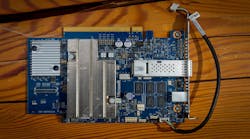Microsoft Will Share Data, Tools to Speed Chinese AI Development
Microsoft Corp. will set up an open platform with four of China’s most prestigious universities to share its data and tools on artificial intelligence, quickening efforts to try and wrest clients away from local giants.
The company demonstrated its AI chip system, Project Brainwave, in Beijing on Monday. It showed off how “XiaoIce,” its Chinese digital assistant for chats, can emulate people’s voices, converse with humans over the phone and even compose poetry, echoing Google’s now-infamous demo to convince developers to adopt it as the chatbot of choice.
The displays encapsulate Microsoft’s efforts to use AI tools to win customers from more entrenched global rivals, including Amazon.com Inc. and Alphabet Inc. Among cloud vendors, AI services are regarded as effective at winning new business. And where Google’s services are blocked in China, Microsoft’s Brainwave and Azure cloud computing service is permitted thanks to its partnership with a local player. The Chinese market however remains dominated by the likes of Baidu Inc., Alibaba Group Holding Ltd. and Tencent Holdings Ltd.
“As the global and Chinese AI market keeps evolving it’s very important to have a global perspective,” Microsoft Executive Vice President Harry Shum told hundreds of developers and industry executives at the Microsoft AI Innovate event on Monday. “We hope we can democratize AI.”
Project Brainwave uses advanced chips designed specifically to supercharge the training of machine learning in a manner similar to Google’s Tensor Processing Units.
The company now plans to create an open-AI platform with Peking University -- considered one of the country’s top schools -- the University of Science and Technology of China, Xi’an Jiaotong University and Zhejiang University. That platform will give students and lecturers AI training tools and datasets to help advance their AI work.
Globally, Microsoft is focusing the efforts of some 8,000 employees from researchers to engineers on artificial intelligence products, tools and advances. The increased investment comes amid an exploding focus on AI and machine learning that’s triggered an influx of startup funding as well as significant moves by key rivals like Google, Facebook Inc., Apple Inc. and Amazon.
At the same time, Microsoft Chief Executive Officer Satya Nadella has focused on the questions around ethics, privacy and bias churned up by the increasing use of AI software with its massive reliance on data -- and a tendency to be prejudiced in sometimes dangerous ways if systems are designed poorly.










